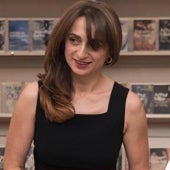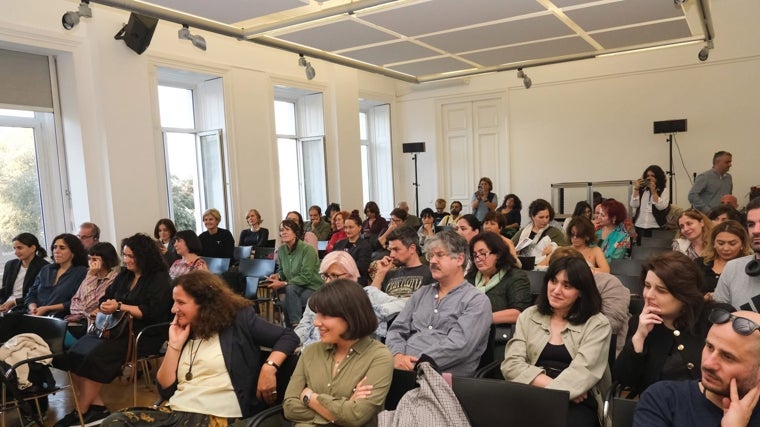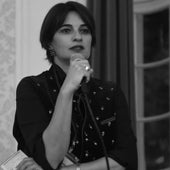Georgian literature opposes Putin: "Our writers are working hard to confront the new Russian occupation attempts."

"This is how we lived in Georgia , sometimes drawing a hell and sometimes a blue mountain range," writes poet Besik Kharanauli in 'The Song of the Dead'. Kharanauli is one of the most renowned Georgian poets. He is also the first to create the work 'Contemporary Georgian Poetry' (Huerga y Fierro Editores), edited by the prestigious translator Lana Kalandia . In an extensive anthology that brings together 16 authors, they have attempted to capture some of the most influential voices of each generation. A selection that brings Georgian poetry closer to Spanish-speaking readers for the first time.
"The anthology combines currents that engage with tradition and identity, alongside others that dare to break away from those ties to open up new creative horizons. We try to offer a vibrant and diverse map," Kalandia explains to our media. Georgia's geographical location between Asia and Europe perfectly explains each of the currents the poets deploy in their verses. Powerful voices such as Lia Liqokeli and Eka Kevanishvili stand out. The translator explains that the authors' writing is distinguished by "a strong expressive courage, emotional intensity, and a lucid view of the world," where they are unafraid to address the personal and social with equal clarity.
One of the most important and highly relevant elements is the authors' rejection of authoritarianism , especially in light of Putin's aggression. "We cannot forget that in 2008 we were the first country in the former Soviet Union to suffer a Russian attack , an event that profoundly marked our recent history and collective conscience," adds Kalandia. This piece of history is also very much in mind by authors like Nato Ingorokva , who warns in her poem "Forgetting" that we should not believe that time heals everything.

The border separating Georgia from Russia is 723 kilometers long . This geographical and political background has led many authors to closely follow the war in Ukraine and Russia's persistent authoritarianism toward their country. Within this critical perspective, poets such as Giorgi Lobzhanidze , who dedicates poems to Ukrainian children, and the aforementioned Ingorokva and Kevanishvili stand out. Lana Kalandia details that these authors define a literary landscape that is not alien to reality, where poetry becomes a testimony that cries out for freedom and the defense of identity in the face of oppression.
Georgia is currently experiencing a critical political climate. Since November 2024, thousands of Georgians have taken to the streets to protest against its proximity to Russia and its distancing from the West. Many believe that justice has been exploited, and there is even talk of an "authoritarian design," and the pre-election tension ahead of the elections (October 2025) is palpable. The Tbilisi International Literature Festival (TIFL) , Georgia's most important literary gathering, has addressed this myriad of political and economic adversities. It will be held from September 19 to 23.
 Tbilisi International Poetry Festival in its last edition
TIFL
Tbilisi International Poetry Festival in its last edition
TIFL
TIFL celebrates its tenth anniversary amid a severe sociopolitical crisis sweeping the entire country. Since its inception, it has hosted around 200 authors from 40 countries with the aim of connecting Georgian readers with global literary trends by creating opportunities for collaboration. Its director, Natasha Lomouri, explains that Georgian writers are at the forefront of the protests taking place in their country, as "literature and art cannot remain on the sidelines of this complex sociopolitical landscape."
As he tells our newspaper, contemporary Georgian literature is deeply connected to the struggles, serving as a voice of protest and acting as a moral compass, reflecting events rather than simply telling stories. He points out that Georgian writers "strive to create witty and uncompromising texts that confront Russia's new attempts at occupation ." He emphasizes that the main challenge in holding the tenth edition of the festival has been financial, because "cultural policies have shifted toward repression." This has led to their sole dependence on international partners, foundations, and embassies.

Both Natasha Lomouri , Director of TIFL, and Lana Kalandia , Georgian translator of such greats as Vargas Llosa , García Márquez , and Javier Marías , represent the effort to bring Georgian poetry to other languages and latitudes. They admit that their will is born from a love of literature, from the desire to give their country joy, taking into account a resistance that must advance, despite having the invader close by. "Europe is a pink blimp […] although there are more aspirants / than the blimp can fit," writes Georgian poet Lela Samniashvili in her poem 'Blimp'. Good poetry always aspires to freedom, not authoritarianism.
ABC.es




